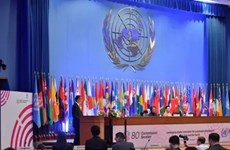State’s role in development discussed
Researchers, policy-makers and foreign donors on Dec. 10 gathered in Hanoi to
discuss the state’s role in Vietnam’s future as the country’s long-term plan
ends next year.
Researchers, policy-makers and foreign donors on Dec. 10 gathered in Hanoi to
discuss the state’s role in Vietnam’s future as the country’s long-term plan
ends next year.
During the conference, participants discussed the state’s role in the transition process of Vietnam as next year will be the last year of the country’s five-year plan of socio-economic development (2006-2010) and ten-year plan from 2001 to 2010. They also suggested new ideas for the next five-year plan from 2011-2015.
The conference, held by the Central Institute of Economic Management (CIEM) under the Ministry of Planning and Investment, is part of an assistance programme to support Vietnam ’s macro-economic reforms by the German government.
Matthias Reiche, a representative from the German Federal Ministry for Economic Cooperation and Development (BMZ) told the meeting that the five-year and ten-year plans are framework strategies that shape the socio-economic development of the country and also a guideline for foreign donors that wish to support the government.
Reiche said the government of Germany will continue to assist Vietnam in conducting large-scale reforms.
The meeting reviewed the achievements Vietnam has made in recent years, including its success of maintaining high growth rates for a long period of time and stabilising the national economy.
Vietnam has started economic restructuring, opened its economy to the world and promoted non-state economic sectors, which helped reduce the poverty rate and settle many socio-economic issues.
Participants, however, emphasised that there still exist some bottlenecks that stand in the way of developments concerning institution, infrastructure and human resources.
They pointed out four main responsibilities of the state that should be better fulfilled, including intervention into the economy, provision of services, settlement regional gaps and protection of social welfare and order.
Researchers also stressed that further efforts are needed in the areas of administrative and state enterprise reforms and policies for regional development and social welfare./.
During the conference, participants discussed the state’s role in the transition process of Vietnam as next year will be the last year of the country’s five-year plan of socio-economic development (2006-2010) and ten-year plan from 2001 to 2010. They also suggested new ideas for the next five-year plan from 2011-2015.
The conference, held by the Central Institute of Economic Management (CIEM) under the Ministry of Planning and Investment, is part of an assistance programme to support Vietnam ’s macro-economic reforms by the German government.
Matthias Reiche, a representative from the German Federal Ministry for Economic Cooperation and Development (BMZ) told the meeting that the five-year and ten-year plans are framework strategies that shape the socio-economic development of the country and also a guideline for foreign donors that wish to support the government.
Reiche said the government of Germany will continue to assist Vietnam in conducting large-scale reforms.
The meeting reviewed the achievements Vietnam has made in recent years, including its success of maintaining high growth rates for a long period of time and stabilising the national economy.
Vietnam has started economic restructuring, opened its economy to the world and promoted non-state economic sectors, which helped reduce the poverty rate and settle many socio-economic issues.
Participants, however, emphasised that there still exist some bottlenecks that stand in the way of developments concerning institution, infrastructure and human resources.
They pointed out four main responsibilities of the state that should be better fulfilled, including intervention into the economy, provision of services, settlement regional gaps and protection of social welfare and order.
Researchers also stressed that further efforts are needed in the areas of administrative and state enterprise reforms and policies for regional development and social welfare./.












